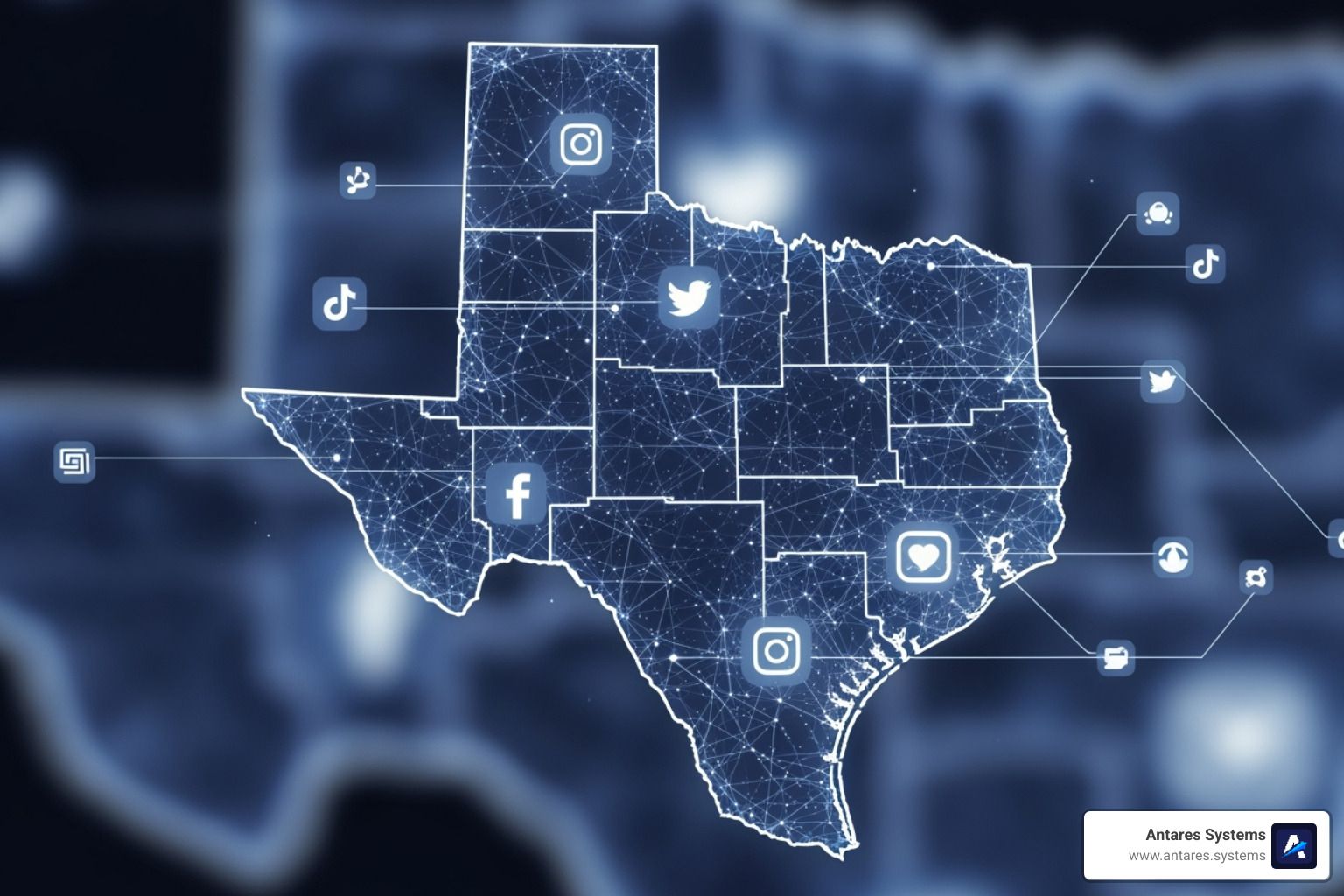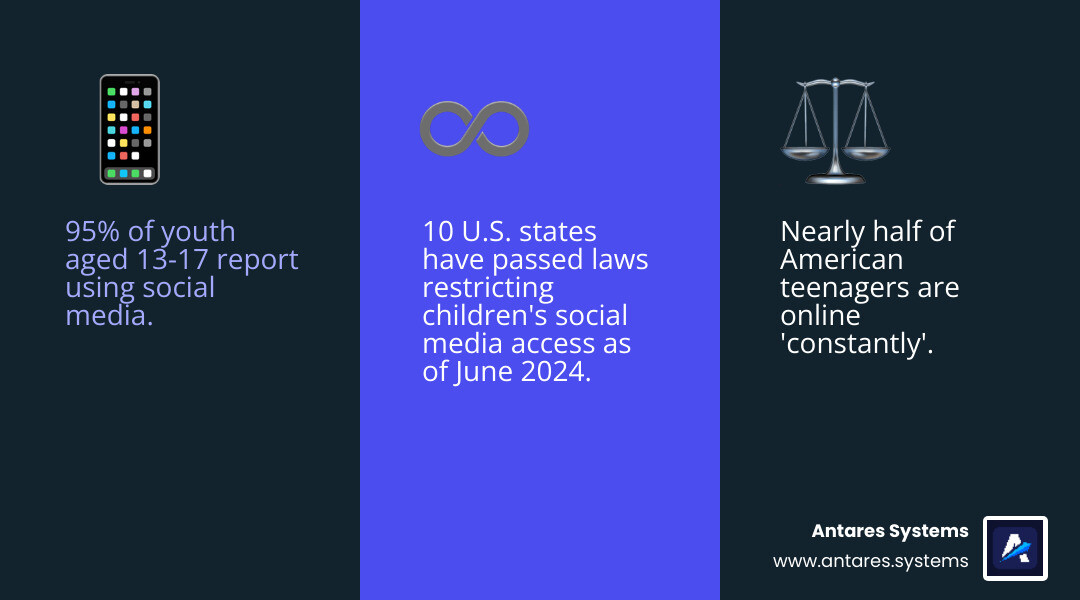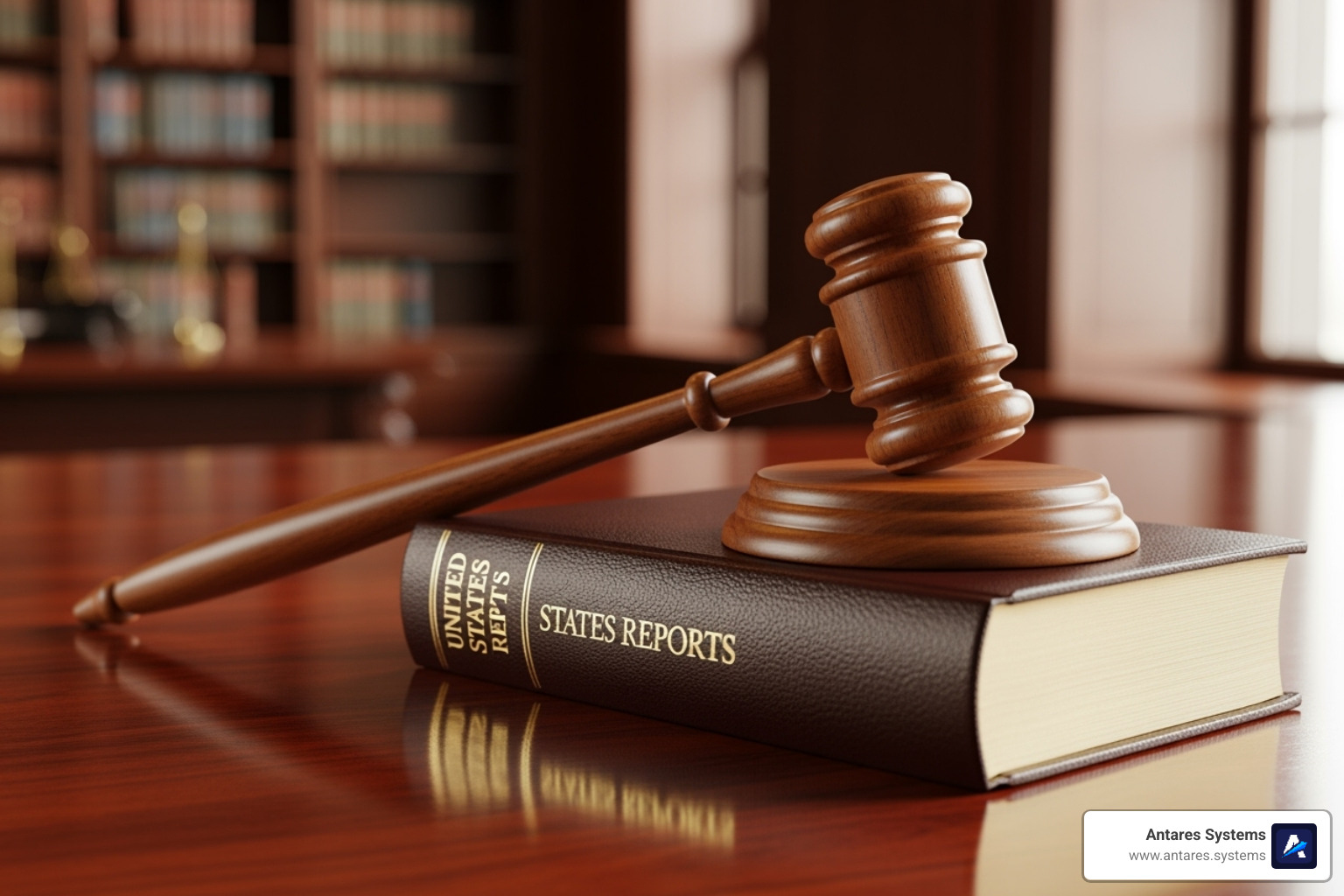The Lone Star State's Social Media Stance: Navigating New Restrictions

Understanding Texas's New Social Media Laws and Restrictions
Social media Texas legislation has become a hot topic as the state grapples with protecting young users while preserving free speech rights. Here's what you need to know about current and proposed laws:
Current Texas Social Media Laws:
- Senate Bill 2420- Requires app stores to verify ages and get parental consent for users under 18
- SCOPE Act (HB 18)- Gives parents more control over children's online activity in schools
- Failed House Bill 186- Would have banned all social media for users under 18 (did not pass)
Key Requirements:
- App stores must verify user ages before downloads
- Parental approval needed for minors to download apps or make purchases
- School districts must get parental consent for most software and social media apps
Texas joins a growing trend of states trying to regulate social media for minors. While the most restrictive proposal failed, the state has still enacted meaningful changes that affect how young people access social media platforms.
The debate centers on a striking reality: 95% of youth aged 13 to 17 report using social media, with more than a third stating they use it "almost constantly." Nearly half of American teenagers say they are online "constantly."
As State Rep. Jared Patterson, who sponsored the failed comprehensive ban, expressed deep disappointment: the "weight of an entire generation of kids who've had their mental health severely handicapped as a result of the harms of social media" drives much of the legislative push.
But critics like Ari Cohn from FIRE argue these laws "trample on the well-established First Amendment rights of both minors and adults to speak and receive information online."

The Failed Ban: What Was Texas House Bill 186?
Driven by concerns over youth mental health, Texas lawmakers proposed the sweeping House Bill 186. It aimed to be one of the nation's strictest laws limiting minors' social media access, a move that would have significantly reshaped the digital landscape for young Texans.
At its core, HB 186 sought a comprehensive under-18 ban on platforms like Instagram, TikTok, and Facebook. To enforce this, the bill required platforms to rigorously verify user ages. The proposed law also included a provision for parental deletion requests, allowing verified parents to demand the removal of their children's existing accounts.
The bill’s author, Republican Rep. Jared Patterson of Frisco, championed the measure, which was approved by the Texas House with bipartisan support. Despite this momentum, HB 186 ultimately failed to become law after missing a crucial legislative deadline. As Rep. Patterson took to social media to express his frustration, he called the bill's failure "the biggest disappointment of my career," feeling the "weight of an entire generation of kids who’ve had their mental health severely handicapped as a result of the harms of social media." The "eleventh-hour slowdown" he described suggests powerful forces prevented the bill from clearing the Senate, highlighting the complex interplay of public concern, political will, and industry lobbying.

Arguments For and Against the Ban
The debate surrounding HB 186 is multifaceted, touching upon child protection, mental health, and constitutional rights.
Proponents like Rep. Patterson focused on protecting youth mental health, citing research on the detrimental concerns about the effects of social media on young minds. The American Psychological Association, for instance, has urged tech companies and lawmakers to protect children's mental health, calling social media platforms "particularly risky" for youth who struggle with impulse control. The platforms' design, with endless scrolls and notifications, is often criticized as intentionally addictive. Lawmakers cited stories of suicide and bullying as direct consequences of online dangers, arguing platforms aren't doing enough to curb harmful content and abuse. Senator Adam Hinojosa, another proponent, believed social media platforms were a threat, stating, "We confront the evil before us and boldly say, ‘You cannot have our children.’"
However, the ban faced significant opposition on legal and constitutional grounds. Critics argued a blanket ban for those under 18 infringed upon First Amendment free speech rights. Ari Cohn of the Foundation for Individual Rights and Expression (FIRE) stated that HB 186 "tramples on the well-established First Amendment rights of both minors and adults to speak and receive information online," calling its language "stunningly broad." The argument is that social media is a vital platform for young people's expression, connection, and access to information.
Beyond constitutional issues, many argued a ban could limit teen opportunities. For example, teenage athletes worried it would hurt college recruitment and Name Image and Likeness (NIL) opportunities, as social media is used to share highlights and connect with coaches. A 17-year-old TikToker, Morgan McGuire, with over a million followers, argued an outright ban could harm mental health by removing support systems. The bill also raised privacy concerns, as age verification would require collecting sensitive personal data, raising questions about data security. As we know from our work in Secrets Social Media SEO , managing online presence and data is a delicate balance. Critics also questioned the bill's inconsistent focus, noting it didn't address online gaming, another space where negative interactions occur.
Beyond the Ban: Other Texas Online Safety Laws
While the comprehensive social media Texas ban in House Bill 186 didn't make it across the finish line, Texas lawmakers weren't ready to throw in the towel on protecting kids online. Instead, they took a different approach—one that's proven more successful and arguably more practical.
The biggest win came with Senate Bill 2420 , which Governor Greg Abbott signed into law. This legislation takes aim at app store regulation, putting companies like Apple and Google in the hot seat. Rather than banning social media outright, SB 2420 requires these tech giants to verify users' ages and get parental consent before any minor can download apps or make in-app purchases.
Think of it this way: instead of locking the front door completely, Texas decided to make sure parents get the keys. This age verification requirement means mom and dad have a real say in what their kids can access on their phones. It's a middle-ground approach that acknowledges both parental rights and the reality that technology isn't going anywhere.
Of course, Apple and Google weren't exactly thrilled about this new responsibility. Apple raised concerns about user privacy, arguing that collecting all this personal information for age verification could actually create new risks. They've pushed back, suggesting there might be better ways to protect kids without demanding so much sensitive data from users. The tech industry opposition highlights the ongoing tension between regulation and innovation—a balancing act that's playing out across the country.
Texas also passed the SCOPE Act (HB 18), which focuses on schools rather than app stores. This law requires school district consent from parents before kids can use most software and social media applications in the classroom. While parts of this law faced legal challenges and were blocked by a federal judge, it shows Texas's commitment to giving parents more control over their children's digital experiences, even in educational settings.
These laws represent a shift in strategy. Instead of the all-or-nothing approach of HB 186, Texas chose targeted regulations that empower parents and hold tech companies accountable. It's like the difference between building a wall and installing better locks—both aim to protect, but one allows for more flexibility and parental choice.
The success of SB 2420 demonstrates that social media Texas regulation doesn't have to be about complete bans. Sometimes the most effective approach is giving parents the tools they need to make informed decisions about their children's digital lives. As businesses steer these changing digital landscapes, understanding these regulations becomes crucial—much like how we help companies understand What's Apple Business Connect and other platform requirements.

The Impact of Social Media on Texas Youth
The push for social media Texas legislation isn't happening in a vacuum—it's driven by very real concerns about what's happening to kids online. The research paints a picture that would worry any parent, and frankly, it explains why lawmakers are scrambling to find solutions.
The American Psychological Association has been sounding the alarm bells for good reason. They've found that social media platforms are "particularly risky" for young people who are still learning impulse control and how to step away from their screens. When you consider that nearly half of American teenagers say they're online "constantly," you start to understand the scope of the problem.
This constant connectivity isn't just about spending too much time scrolling—it's creating serious mental health challenges. Kids are dealing with increased anxiety, depression, and self-esteem issues at rates we've never seen before. The always-on nature of social media means there's no real escape from social pressures and negative experiences.
Bullying has taken on a whole new dimension in the digital age. Cyberbullying can follow kids home, happen anonymously, and reach massive audiences instantly. Unlike schoolyard bullying that ended when the bell rang, online harassment can be relentless and inescapable. For many Texas youth, their phones have become sources of stress rather than connection.
The harmful content exposure is another major concern driving legislative action. Despite content filters and community guidelines, kids regularly encounter sexually explicit material, content promoting self-harm, eating disorders, and extremist ideologies. Platform algorithms, designed to keep users engaged, can actually push vulnerable young people toward increasingly harmful content.
Perhaps most pervasive are the body image issues stemming from constant social comparison. Young people are bombarded with carefully curated, filtered images that create impossible standards. The gap between reality and what they see online is contributing to eating disorders, body dysmorphia, and feelings of inadequacy that can last well into adulthood.
Studies continue to explore these connections, providing lawmakers and parents with data that's hard to ignore. The research consistently shows that the impact isn't just about screen time—it's about how these platforms are fundamentally changing how young people see themselves and interact with the world.
For Texas families, these aren't abstract statistics—they're daily realities. Parents are watching their kids struggle with issues that didn't exist a generation ago, and they're looking to their elected officials for help. Understanding these impacts is crucial not just for families, but for businesses trying to steer the digital landscape responsibly, including how platforms like What's Apple Business Connect are adapting to these concerns.
The social media Texas debate ultimately comes down to this: how do we protect kids while preserving the benefits that technology can offer? It's a question that's driving policy decisions not just in Austin, but across the country.
The National Landscape of Social Media Texas Regulation
Texas isn't fighting this battle alone. Across the country, states are struggling with the same question: how do we protect our kids online while respecting constitutional rights? The numbers tell the story - at least 11 states have enacted restrictions on social media use for young people over the past two years, and lawmakers in 27 states tried this year to advance bills addressing minors' social media use.
It's like watching dominoes fall, but each state is taking its own approach to the problem.
Florida made headlines with one of the most aggressive moves. Their social media ban completely prohibits children younger than 14 from joining social media platforms. Kids who are 14 and 15 need parental consent to sign up. While the law faces court challenges, it's still in effect - making Florida's approach even stricter than what Texas originally proposed.
Utah thought they had cracked the code by requiring social media companies to verify ages for all users and place restrictions on minor accounts. This first-in-the-nation law seemed promising until it hit a major roadblock. A federal judge temporarily blocked the law in 2024, highlighting just how tricky these regulations can be legally. Arkansas and Ohio faced similar setbacks, with their social media restriction laws also blocked by federal judges on free speech grounds.
The legal battles are fierce. Tech trade groups like NetChoice- whose members include major platforms like Meta, Google, and X - are fighting hard against these laws. They argue these regulations are "censorship regimes masquerading as online safety laws." It's a David versus Goliath situation, with states trying to protect kids while tech giants defend their business models.
California is taking a completely different route. Starting in 2027, they're targeting the root of the problem - those addictive feeds that keep kids scrolling endlessly. Their law makes it illegal for platforms to knowingly provide addictive feeds to children without parental consent. Instead of banning access, they're focusing on how platforms are designed.
New York jumped on the parental control bandwagon, allowing parents to block their kids from getting posts suggested by algorithms. Nebraska and Connecticut have also joined the movement, requiring parental consent for anyone under 18 to open social media accounts.
The pattern is clear: every state wants to help, but nobody can agree on the best approach. Some want outright bans, others prefer parental controls, and a few are targeting platform design itself.
Even Washington D.C. is paying attention. A bipartisan group of senators introduced the Kids Off Social Media Act this year, which would ban platforms from allowing kids under 13 to create accounts. But like many federal initiatives, it's been sitting in committee since February - showing just how difficult comprehensive federal legislation can be.
This patchwork of state laws creates a confusing landscape. What's legal in Texas might be banned in Florida. A platform that complies with California's rules might violate Utah's requirements. For parents, kids, and even businesses trying to steer social media Texas regulations and beyond, it's a constantly shifting maze of rules and court decisions.
The one thing everyone agrees on? Something needs to change. The question is what approach will actually work - and survive the inevitable court challenges.

How Social Media Platforms are Responding
Social media companies aren't just sitting back and watching lawmakers debate their fate. They're scrambling to implement new safety features, hoping to stay ahead of regulation while keeping their young users engaged. It's a delicate balancing act between protecting kids and protecting their bottom line.
Meta has been particularly active in rolling out new protections. Since 2023, they've been showing teens a notification when they spend 20 minutes on Facebook, gently nudging them to take breaks. They've also launched parental supervision tools that let parents schedule app breaks for their teenagers. Instagram has followed suit with teen-focused features that give parents more oversight into their children's online activities.
These changes align perfectly with laws like Texas's SB 2420, which emphasize parental control over outright bans. For businesses working in this space, understanding these platform changes is crucial - just like when we help clients steer How to Create a Business Profile on Facebook and adapt to evolving platform requirements.
TikTok has made some of the most dramatic changes. Over the past five years, they've implemented age-restricted features including limits on direct messaging and livestreams for users under 18. They've made accounts private by default for users aged 13 to 15. Most notably, in 2023 TikTok instituted a 60-minute daily screen time limit for users under 18 - a significant step toward curbing excessive usage.
But here's where it gets interesting: while platforms are implementing these safety features, they're also fighting proposed regulations tooth and nail. Through trade groups like NetChoice, tech companies argue that state-level bans violate free speech and create impossible compliance requirements. They'd rather handle things themselves than deal with a patchwork of different state laws.
The companies have a point about complexity. Imagine trying to verify ages differently for Texas users versus Florida users versus California users - all while maintaining a seamless user experience. It's like trying to run a restaurant where every table has different menu requirements.
Default private accounts, content filtering, and improved reporting systems have become standard across most major platforms. But critics argue these changes are too little, too late - reactive responses to regulatory pressure rather than proactive protection of young users.
The ongoing back-and-forth between lawmakers and tech companies suggests this dance is far from over. As states like Texas continue pushing for stronger regulations, platforms will likely keep adapting their features. The question remains whether these industry-led solutions will be enough to satisfy concerned parents and legislators, or if more comprehensive social media Texas regulations are inevitable.
Frequently Asked Questions about Texas Social Media Laws
If you're a parent or business owner trying to steer the changing digital landscape, you're probably wondering what all these new laws actually mean for your family or business. Let's break down the most common questions we hear about social media Texas regulations in plain English.
Is social media banned for minors in Texas?
Here's the short answer: No, there's no blanket social media ban for kids in Texas. The big news you might have heard about was House Bill 186, which would have banned anyone under 18 from using social media platforms entirely. But that bill never made it across the finish line - it missed a crucial legislative deadline and died in the process.
What Texas did pass is something quite different. Senate Bill 2420 takes a more targeted approach by focusing on app stores rather than the platforms themselves. Think of it as putting a checkpoint at the front door rather than banning the whole building. Under this law, app marketplaces like Apple's App Store and Google Play Store must now get parental permission before letting minors download apps or make purchases.
So while your teenager can still scroll through Instagram or post TikTok videos, there are new problems in place for getting those apps in the first place.
What are the current online rules for kids in Texas?
The main rule affecting Texas families right now is Senate Bill 2420, which we just mentioned. This law requires app stores to verify users' ages and get mom or dad's okay before any minor can download apps or spend money on in-app purchases.
There's also an older law called the SCOPE Act (HB 18) that affects what happens in schools. This one requires school districts to get parental consent before using most software and social media applications in the classroom. It's all about making sure parents stay in the loop about their kids' digital activities during school hours.
These aren't about stopping kids from using technology - they're about making sure parents have a say in how their children engage with digital platforms. It's like requiring a permission slip for the digital age.
What are the main legal challenges to social media bans?
The biggest roadblock for social media Texas restrictions - and similar laws across the country - comes down to the First Amendment. You know, that part of the Constitution about free speech.
Civil liberties groups and tech industry associations argue that banning social media for minors tramples on young people's constitutional rights to express themselves and access information online. Ari Cohn from the Foundation for Individual Rights and Expression put it bluntly, saying these laws "trample on the well-established First Amendment rights of both minors and adults to speak and receive information online."
The legal battles have been pretty consistent across different states. Federal judges have temporarily blocked or struck down similar legislation in Utah, Arkansas, and Ohio, all citing free speech concerns. The core question that keeps coming up in courtrooms is this: when can the government restrict someone's access to information and communication, even if it's meant to protect them?
It's a tricky balance between protecting kids and preserving constitutional rights - which is probably why we're seeing such a patchwork of different approaches across the country rather than one clear solution.
Conclusion: The Future of Online Regulation in the Lone Star State
The journey of social media Texas legislation has been quite the rollercoaster ride. While House Bill 186's comprehensive ban on social media for minors didn't make it across the finish line, it accomplished something equally important - it sparked a statewide conversation about protecting our kids online. The failure of this ambitious bill wasn't the end of the story, though. Instead, it marked the beginning of a more nuanced approach to digital safety.
The passage of Senate Bill 2420 shows that Texas lawmakers are willing to adapt their strategy. Rather than swinging for the fences with an all-or-nothing ban, they've focused on app store accountability and giving parents more control. This shift toward empowering families and holding tech companies responsible seems to be the path forward that actually works.
Looking ahead, we can expect the ongoing debate around youth online safety to continue evolving. The legislative focus shift toward parental controls and platform responsibility makes a lot of sense when you consider the legal challenges that total bans have faced nationwide. Courts have consistently pushed back on overly broad restrictions, so lawmakers are getting smarter about crafting laws that can actually stick.
What does this mean for the future prospects for regulation? We'll likely see more targeted approaches like age verification requirements, improved parental notification systems, and rules that make platforms more transparent about how their algorithms work. The days of trying to ban entire platforms are probably behind us, but that doesn't mean the push for accountability is slowing down.
For businesses trying to steer this changing digital landscape, staying informed about these regulations is crucial. At Antares Systems, we understand that navigating digital marketing in an environment of evolving laws can feel overwhelming. Whether you're a home services company, law firm, or construction business in the Rio Grande Valley, these changes affect how you connect with customers online.
Our team specializes in helping local businesses build strong, compliant online presences that work within whatever regulatory framework emerges. From our AI-powered website design to comprehensive local SEO strategies, we make sure our clients can focus on running their businesses while we handle the complexities of digital marketing.
If you're ready to strengthen your online presence while staying ahead of regulatory changes, we'd love to help. Check out our Local SEO Services McAllen, TX to see how we can help your business thrive in Texas's evolving digital landscape.








